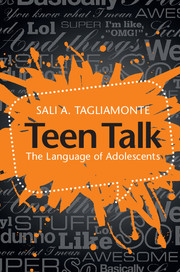Book contents
- Frontmatter
- Dedication
- Contents
- List of figures
- List of tables
- Preface
- 1 What's all the fuss about teen language?
- 2 Teens talking
- 3 Methods: how to tap teen language?
- 4 Quotatives: I'm like,“Oh my God!”
- 5 Intensifiers: upping the ante – super cool!
- 6 How do you start a sentence?
- 7 Sentence enders: finish with a flourish
- 8 Generics: stuffology
- 9 Just: just what?
- 10 Adjectives: the good, bad, and lovely
- 11 Other funky teenage features: You know what? I dunno. Whatever!
- 12 Internet language: everyone's online
- 13 Are they always going to talk like that?
- Notes
- References
- Author index
- Keyword index
5 - Intensifiers: upping the ante – super cool!
Published online by Cambridge University Press: 05 June 2016
- Frontmatter
- Dedication
- Contents
- List of figures
- List of tables
- Preface
- 1 What's all the fuss about teen language?
- 2 Teens talking
- 3 Methods: how to tap teen language?
- 4 Quotatives: I'm like,“Oh my God!”
- 5 Intensifiers: upping the ante – super cool!
- 6 How do you start a sentence?
- 7 Sentence enders: finish with a flourish
- 8 Generics: stuffology
- 9 Just: just what?
- 10 Adjectives: the good, bad, and lovely
- 11 Other funky teenage features: You know what? I dunno. Whatever!
- 12 Internet language: everyone's online
- 13 Are they always going to talk like that?
- Notes
- References
- Author index
- Keyword index
Summary
If I was talking to you on an ongoing basis I wouldn't use a swear word necessarily, but it seems to me the young people do that to a certain extent. Now I don't know whether that's more anecdotal. As a teacher you don't really hear that 'cause they don't swear in front of you.
(Dirk Brooks, 73)Even though language is always changing, it is actually difficult to catch language change in action. This is because many of the changes language undergoes take place slowly over a very long period of time, sometimes thousands of years. However, some parts of a language change constantly – so continuously in fact, that sometimes you can stand a good chance of catching them while they are happening. This is a story about how I caught another language change in progress.
Some of the best places to look for language change are those where people use words imaginatively. Slang terms are a good example. Most changes in the selection of words are lexical changes. If you want to tap into more systemic changes in progress a better place to look is within the grammatical devices of the language. In this study, I examined adverbs. Adverbs are words that add further meaning to other words. They can act to tone words down or boost them up. In the latter case they are called “intensifying” adverbs. Take for example a day that is colder than usual. How would you describe such a day? You can “up the ante,” so to speak, and say that it is very cold. You can also diminish the quality of an adjective as well. You could say, for example, it is kind of cold … sort of cold … or moderately cold. The words that tone down the nature of the cold are also adverbs, but in this case they are called down-toners, as in (66).
a. That's kind of funny but, ah, it was good fun. (Craig Thompson, 18)
b. So the neighborhood's changing a lot but it's still fairly well mixed. (Shannon Ermak, 19)
c. It was kind of confusing but a lot of fun. (Cheryl Choi, 12)
Listen out on days that are either bitterly cold or burning hot. You may hear all kinds of adverbs.
- Type
- Chapter
- Information
- Teen TalkThe Language of Adolescents, pp. 81 - 94Publisher: Cambridge University PressPrint publication year: 2016

